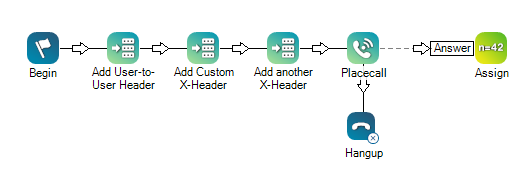|
|
Allows scripts, along with Sipgetheader, to interact with remote SIP A setting must be enabled on the SIP trunk groups within the CXone platform to allow for headers to be accepted. Contact your customer service representative to enable the setting. |
Supported Script Types
|
|
| Phone |
Similar Action
The SIPXFERPUTHD action is similar to Sipputheader, but is for use when doing blind transfers.
Properties
| Property | Details |
|---|---|
| HeaderName |
The name of the header. Must be one of the following:
|
| HeaderValue |
Header values can be arbitrary data or script variables. |
Branches
| Branch | Details |
|---|---|
|
Default |
Path taken unless the script meets a condition that requires it to take one of the other branches. It is also taken if the other branches are not defined. |
| OnError | Path taken when the action fails to execute properly. |
Script Example Using Sipputheader

Tips & Tricks
- Execute the Sipputheader action, multiple times if desired, before execution of a Placecall action.
- The same SIP
 Protocol used for signaling and controlling multimedia communication sessions such as voice and video calls. header can be put multiple times, which means the same header, with different values, will be repeated in the SIP messages.
Protocol used for signaling and controlling multimedia communication sessions such as voice and video calls. header can be put multiple times, which means the same header, with different values, will be repeated in the SIP messages. - SIP headers can be sent and received only on the initial SIP Invite message or the final 2xx response to an initial Invite. Only headers that start with “X-“ or “P-“ can be sent and only headers that start with “X-“ can be received.
- If the call with the remote carrier does not use SIP, the SIP header actions have no effect. No SIP header can be sent and no SIP header can be received for the call leg.
- This action only affects headers used with a Placecall action. If you need to affect headers for a blind transfer, use the SIPXFERPUTHD action.

